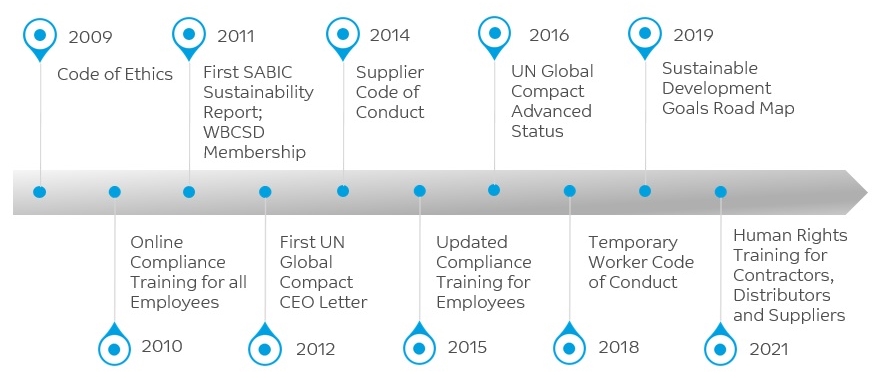
SABIC Human Rights Program
Vision
At SABIC, we seek to create Chemistry that Matters™ in a manner that respects and fosters human rights in our daily operations. We embrace this same position with our business partners in our value chain, in the communities where we operate, and in the application and use of our products. As detailed throughout this page, we deploy numerous cross-functional resources in support of this aspiration.

Commitments
SABIC is committed to respecting human rights in accordance with the spirit of the following frameworks:
- UN Guiding Principles on Business and Human Rights
- International Labour Organization Declaration on Fundamental Principles and Rights at Work
- Principles of the UN Global Compact

Governance
Our human rights obligation starts at the top. Our Executive Committee is responsible for ensuring that our company operates in line with our Code of Ethics. Our ESG Reporting Steering Committee is cross-functional and includes executives from Technology and Innovation, Corporate Sustainability, Investor Relations, Finance, Human Resources, Strategic Business Units (SBUs), Manufacturing and Corporate Governance. The day-to-day responsibility for the company’s human rights performance lies within Legal Affairs, Procurement and Human Resources, which work closely together with our business units and functions.
Access to Remedy
SABIC has grievance procedures in place to ensure that compliance concerns are properly processed and managed. Appropriate internal resources are available to receive, investigate and resolve concerns. Our Speak-Up tools are available to all employees, contractors, suppliers and other third parties to report any concerns. These can include human rights concerns of suppliers, impacted community members, and NGOs. We strictly prohibit retaliation of any kind against anyone for raising or helping to address a compliance concern.

Internal Processes
The Fair Employment Practices Policy in our Code of Ethics is our foundational internal document on human rights. It describes our culture of respect and fair employment practices that prohibits all forms of illegal discrimination. All employees are trained on this policy every two years.
Our internal obligations are also extended in our EHSS Policy in our Code of Ethics. We are dedicated to operate facilities safely and responsibly, continuously improving programs to promote safety and minimize employee and contractor injuries and illnesses.
We ensure that our manufacturing operations demonstrate respect for the people who make our products while respecting the rights of people living in the communities around our facilities, those of our suppliers and others who may be affected by these operations.

Freedom of expression
Freedom of expression, association, and peaceful assembly support stable business. SABIC does not interfere or inhibit the peaceful, lawful and safe activities of people to exercise these rights even if these should be linked to issues related to our business.
For example, SABIC’s management standards require the formation of Environmental Health Safety and Security (EHSS) committees at various levels to provide for involvement of employees in monitoring EHSS performance and implementing and improving EHSS programs. Specifically, each facility is required to hold shift and shop floor EHSS meetings to discuss EHSS incidents, concerns, and issues.
We will not contribute to or support retaliation, threats, intimidation or attacks against those who express their opinions, assemble freely or raise human rights-related concerns in relation to our operations.
External Processes
We are committed to proactively address any potential human rights impacts of our business activities, mitigate any negative impacts, and work to enhance the benefits to local communities. SABIC has a strong culture of giving and volunteerism that complements our commitment to human rights. This culture inspires our investments in corporate social responsibility (CSR) programs to create lasting, positive impacts for societies and environments throughout our global communities.
In compliance with the laws of the jurisdictions where we operate, we provide disclosures on the California Transparency in Supply Chains Act and UK Anti-Slavery Act.
In our supply chain, we use our Supplier Lifecycle Management Due Diligence program to minimize human rights risks. All direct suppliers must acknowledge our Supplier Code of Conduct, which includes specific labor and human rights expectations. They also undergo pre-contract screening, which includes questions around employee wages, age and working conditions. Higher risk suppliers are provided with training via Trace International. Local language training courses include topics such as avoiding trafficked labor, anti-bribery and economic sanctions compliance.
All temporary and contract workers must acknowledge our Temporary Worker Code of Conduct. Temporary workers, along with all SABIC distributors, are assigned a suite of Trace compliance training courses.
SABIC Human Rights Timeline

